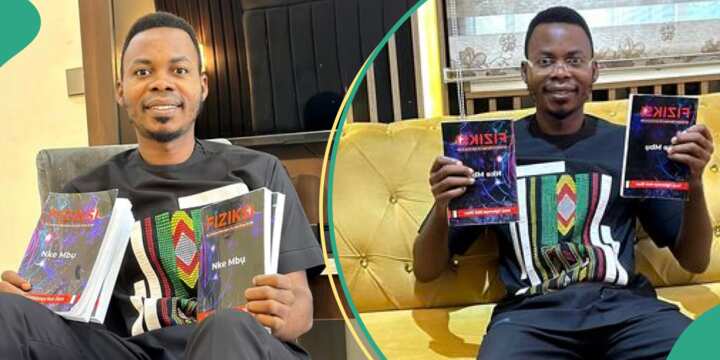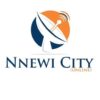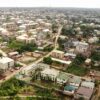Biography
Maazi Ogbonnaya Okoro || Profiling the Man Behind Igbo Physics(Fiziksi) Textbook
Meet Maazi Ogbonnaya Okoro – the Igbo linguist and author who translated the first physics textbook in Igbo (Fiziksi). A clear, warm profile of his life, work, and vision.

When the news broke that a young Nigerian linguist had written a physics textbook entirely in Igbo, it stirred equal parts surprise, admiration, and curiosity. How could someone merge the seemingly distant worlds of traditional language and modern science so seamlessly?
That someone is Maazi Ogbonnaya Okoro. A scholar, translator, and passionate advocate for indigenous language education whose groundbreaking work, Fiziksi, is now recognized as the first-ever physics textbook written in the Igbo language.
In an age where English dominates the classroom and local languages struggle for relevance, Ogbonnaya Okoro is charting a new course that insists that African children deserve to learn science in the languages of their hearts. His story is not just about writing “Fiziksi”. More than that, it’s about identity, courage, and the quiet revolution of bringing mother tongues back into the centre of knowledge creation.
This is the story of Ogbonnaya Okoro, the man behind Fiziksi – his journey, his vision, and the powerful message his work carries for the future of education, language, and culture in Africa.
Early Life and Formation
Maazi Ogbonnaya Okoro was born on June 26, 1993, in Umuka-Okposi, a community in Ohaozara Local Government Area of Ebonyi State, Nigeria. He grew up in a close-knit environment where storytelling, proverbs, and ancestral wisdom were part of everyday life.
His grandmother and the elders in his village played a major role in shaping his early love for the Igbo language, history, and traditions. Those early experiences gave him a strong sense of identity and pride in his cultural roots.
From a young age, Ogbonnaya showed deep curiosity and enthusiasm for learning. While many of his peers dreamed of careers in popular or prestigious fields, he was drawn to the beauty of words, expression, and the sound of his mother tongue. He often read and wrote in Igbo, practicing the language not just as a means of communication but as a tool for discovery and creativity.
His decision to study Igbo formally was not always met with support. Some friends and relatives questioned why he would dedicate his academic path to a language many considered “ordinary” or “unprofitable.” Yet, Ogbonnaya remained steadfast.
He believed that the survival and growth of the Igbo people depended on how seriously they took their language. That conviction would later fuel his mission to prove that Igbo could also serve as a language of science, innovation, and scholarship.
The cultural grounding he received in Umuka-Okposi and his early encounters with language shaped the foundation for the man he would become. A bold, forward-thinking linguist committed to restoring dignity and modern relevance to indigenous languages.
Education and Language Training
Ogbonnaya Okoro’s formal education began in his hometown, where he attended local primary and secondary schools that helped to nurture his growing curiosity about languages and human expression. While he excelled in several subjects, it was literature and the Igbo language that fascinated him most. He saw language, not only as a tool for communication but as the heartbeat of a people’s identity.
His academic journey took him to the University of Nigeria, Nsukka (UNN), where he studied Igbo Language and Linguistics. This decision marked a defining moment in his life. At UNN, Ogbonnaya came in contact with leading scholars and thinkers who deepened his understanding of linguistics, semantics, and cultural studies. The university’s environment also encouraged him to explore how indigenous languages could be applied beyond literature and folklore.
During his years at UNN, he became known for his intellectual curiosity and passion for cultural revival. He often participated in student discussions, linguistic debates, and research projects that examined the state of Nigerian languages in a fast-changing world. His academic work reflected a growing concern that indigenous tongues were being pushed to the background by English and other foreign languages.
Driven by a desire to change this narrative, Ogbonnaya Okoro pursued a Master’s degree in Linguistics, focusing his research on language development, preservation, and modernization. His postgraduate studies gave him the technical skills and theoretical grounding to embark on his later groundbreaking projects.
By the time he completed his university education, Ogbonnaya was not just fluent in Igbo but also deeply trained in the art and science of linguistics. He had developed the confidence, knowledge, and sense of mission needed to make Igbo a respected vehicle for learning in all fields, including science, a domain many thought was beyond the reach of African languages.
Expanding the Frontiers
Ogbonnaya Okoro is not just a writer or translator, he is a cultural visionary who works tirelessly to prove that the Igbo language can serve every domain of human knowledge. His career reflects a deep sense of purpose, which is, to give Igbo language a place in classrooms, laboratories, and global conversations about science and education.
One of his most remarkable achievements is Fiziksi, a groundbreaking Physics textbook written entirely in Igbo. With this work, he demonstrated that scientific ideas can be expressed clearly and accurately in indigenous languages.
Fiziksi became a major talking point in both academic and cultural circles, earning him respect across Nigeria and beyond. Through it, Ogbonnaya showed that science does not belong to any one language, instead, every language can be a vessel for discovery and understanding.
Beyond Fiziksi, Ogbonnaya has authored and co-authored several books, poems, and essays that celebrate and expand the possibilities of Igbo literature. His writings explore themes such as cultural identity, language revitalization, and the role of indigenous knowledge in modern education. His books are not only educational but also serve as tools for cultural preservation and pride.
As a teacher and scholar, Ogbonnaya has taught courses in Igbo language, literature, and linguistics at different academic levels. His teaching style combines scholarship with storytelling, making complex ideas accessible and engaging for students. He often integrates contemporary issues into his lessons, showing learners how Igbo can be used to discuss modern realities such as technology, politics, and social change.
In addition to writing and teaching, Ogbonnaya has built digital and physical platforms that promote Igbo learning and research. He is involved in projects that use social media, podcasts, and online communities to connect Igbo speakers and learners around the world. Through these efforts, he encourages a new generation to read, write, and think in Igbo with confidence.
From books to classrooms to digital spaces, Ogbonnaya Okoro continues to expand the boundaries of what is possible with Igbo language. His work stands as proof that with creativity and commitment, indigenous languages can thrive as instruments of education, innovation, and global relevance.
Why He Chose Physics in Igbo
For many people, the idea of writing a Physics textbook in Igbo language might seem unusual or even unnecessary. But for Ogbonnaya Okoro, it was a deliberate and visionary act. He wanted to prove that Igbo language could express the same level of scientific precision and depth found in English or any other global language. His decision came from a deep conviction that knowledge should never be limited by language.
Ogbonnaya saw a troubling pattern in education. Many Igbo students struggled to connect deeply with what they learned because their lessons were always filtered through English. He believed that true understanding begins when learners can think and reason in their mother tongue. If a child can discuss the laws of motion, gravity, or electricity in Igbo, that child is not only learning science but also developing pride and ownership of knowledge.
For Ogbonnaya Okoro, choosing Physics was both symbolic and practical. Science has long been viewed as a field reserved for “foreign” languages, especially English. By writing Fiziksi in Igbo, he aimed to challenge that assumption. He wanted to show that science is universal and that indigenous languages can carry complex concepts when used thoughtfully and consistently. Physics, being the foundation of many scientific disciplines, was the perfect place to begin that journey.
For him, the project was not just about translation but transformation. It was about redefining how African students experience science and how they see their own languages in relation to global knowledge. His work bridges a cultural and intellectual gap that reminds us that language should not be a barrier to understanding the universe, but a bridge to it.
Through Fiziksi, Ogbonnaya Okoro continues to inspire educators, linguists, and students to look at science through new lenses and to embrace the beauty of learning in their own languages.
The Vision, The Process, and the Challenges Encountered with Fiziksi
When Ogbonnaya Okoro set out to create Fiziksi, he was not simply aiming to write another textbook. He was taking on a bold experiment to show that a complex subject like Physics could be taught, studied, and understood in the Igbo language. The project was both a linguistic and intellectual adventure that tested his creativity, discipline, and commitment to cultural renewal.
The idea behind Fiziksi was born out of a simple but powerful question: Why can’t Igbo be used to teach science? For Ogbonnaya, this question revealed a larger problem – many African languages had been confined to culture and tradition while foreign languages dominated education and research. He wanted to change that. His goal was to prove that Igbo could handle scientific vocabulary, formulas, and explanations with clarity and precision.
Writing the book required a unique approach. Ogbonnaya began by studying Physics textbooks in English and identifying key concepts that had no direct Igbo equivalents. He then created new scientific terms in Igbo, carefully blending traditional words, descriptive expressions, and linguistic innovations. This process demanded deep understanding of both Physics and Igbo grammar. Every word had to make sense scientifically and linguistically.
One of the toughest challenges was standardization. Because Igbo language has many dialects, Ogbonnaya had to choose terms that were widely understood or easy to adapt. He also faced skepticism from people who doubted the practicality of writing a science book in an indigenous language. Some even dismissed the project as unrealistic. But he pressed on, supported by a small circle of academics and language enthusiasts who believed in his vision.
After months of research, translation, and editing, Fiziksi emerged as a groundbreaking work – the first comprehensive Physics textbook written fully in Igbo. It covers major Physics topics such as motion, energy, electricity, and matter, all explained in clear, everyday Igbo. Beyond its educational value, the book became a symbol of cultural pride and linguistic resilience.
Fiziksi opened new conversations about the role of African languages in education. It challenged educators to rethink how subjects are taught and inspired new efforts to develop similar materials in other Nigerian languages.
For Ogbonnaya Okoro, the book was more than a literary or academic achievement. It validated the fact that knowledge becomes more powerful when it speaks the language of the people.
What Fiziksi Represents
Fiziksi is more than a Physics textbook. It is a movement. One that redefines how people think about knowledge, culture, and identity. Through this project, Ogbonnaya Okoro sent a powerful message that language is not just a means of communication, but a tool of empowerment and self-discovery.
At its core, Fiziksi represents the idea that learning is most effective when it happens in a language that feels natural to the learner. Ogbonnaya believes that when students learn in their mother tongue, they understand concepts more deeply and connect emotionally with what they are studying. For him, using Igbo to teach Physics was not only about promoting culture. It was also about making education more inclusive and meaningful for Igbo-speaking students.
The book also speaks to a larger question of identity. Many young Africans grow up thinking that academic excellence is tied to speaking English or other foreign languages. Ogbonnaya’s work challenges that belief. By showing that Igbo can handle the language of science, he restores confidence in indigenous languages and the cultural identities they carry.
In a world where globalization often threatens local traditions, Fiziksi stands as proof that modernization and cultural preservation can coexist. It encourages people to take pride in who they are and to see their languages as valuable instruments of learning, research, and innovation.
For educators and linguists, the project opens new possibilities for curriculum development and knowledge production in local languages. For ordinary readers, it is a reminder that language is power, and that reclaiming one’s language is a step toward reclaiming one’s identity.
Through Fiziksi, Ogbonnaya Okoro has built a bridge between heritage and modern education, showing that the path to progress can begin in the language of one’s roots.
Beyond Fiziksi
While Fiziksi brought Ogbonnaya Okoro into the spotlight, his work and vision go far beyond that single project. He continues to dedicate his life to promoting the Igbo language as a living, evolving medium for education, creativity, and cultural pride. His mission is not just to write books but to spark a movement that inspires others to think, teach, and innovate in their native languages.
After the success of Fiziksi, Ogbonnaya expanded his efforts into other areas of language development and digital education. He has written essays, poems, and academic papers that explore how indigenous languages can adapt to modern realities such as technology, globalization, and digital communication. His writings often challenge young Africans to see their languages not as old-fashioned but as tools for leadership and progress.
He also mentors students, teachers, and content creators who share his passion for cultural revival. Through workshops, lectures, and online platforms, he provides guidance on how to write, translate, and create educational materials in Igbo. His approach is practical and inspiring, showing people that they do not need to abandon their cultural identity in order to engage with the modern world.
In addition, Ogbonnaya is an active voice in public discussions about language policy, education reform, and indigenous knowledge systems. He frequently advocates for the inclusion of local languages in science, technology, and innovation programs.
His argument is simple but powerful: when people learn in their own language, they not only understand better but also create solutions that fit their cultural and social realities.
Beyond the classroom and the page, Ogbonnaya Okoro’s work represents a larger vision – a future where African languages occupy their rightful place in global knowledge and intellectual exchange. His ongoing contributions remind us that preserving language is not about looking backward but about preparing for a future that values every culture and every voice.
Reactions, Debates and Ongoing Questions
Like many groundbreaking projects, Fiziksi has sparked both admiration and debate. While many hail Ogbonnaya Okoro as a pioneer for writing a Physics textbook in Igbo, others have raised important questions about the long-term impact, accessibility, and practicality of such an effort. These mixed reactions reflect the broader conversation about how indigenous languages fit into modern education.
Supporters see Fiziksi as a historic achievement. A courageous step toward linguistic equality and educational inclusiveness. They argue that Ogbonnaya’s work proves that African languages can handle complex scientific thought and that students learn best in the language they understand most naturally. Educators, linguists, and cultural advocates often point to Fiziksi as an example that decolonizing education can begin at the level of language.
However, there are also critics who question how far the project can go without broader institutional support. Some wonder whether enough schools have the resources or teachers to use the book effectively. Others argue that science education in indigenous languages must be part of a larger system. One that includes standardized terms, training for teachers, and updated curricula in different subjects.
There are also linguistic challenges. Igbo, like many African languages, has multiple dialects and variations. This makes it difficult to create standardized scientific vocabulary that every learner can understand. Ogbonnaya’s work addresses this issue by developing new, context-based terms, but it remains an area of active discussion among scholars and educators.
Despite these concerns, most agree that Fiziksi is a powerful starting point. It has opened doors for deeper thinking about language, learning, and cultural identity. The debates it inspired are signs of progress and proof that people are engaging seriously with questions about how to make education more relevant to local realities.
For Ogbonnaya Okoro, such critiques are not obstacles but opportunities. He often welcomes feedback as part of a larger process of growth, believing that every question raised helps refine the mission of bringing science and scholarship closer to home, through the words and wisdom of the people themselves.
What’s Next for Ogbonnaya Okoro

At the moment, Ogbonnaya Okoro stands at an exciting junction in his career. His landmark textbook Fiziksi has been released, marking a major milestone in his mission to elevate the Igbo language into the realm of science education. With this achievement behind him, he is turning his attention toward broader goals and future projects.
Currently, Fiziksi is available for schools, libraries, and individuals, and was launched in early 2024. He remains active in translation and language development work, serving as Igbo Translations Director at a UK-based publisher and continuing to advocate for Igbo language use in a variety of formal settings. He is engaged in public discourse around language policy, culture, and education reform, using his platform to promote indigenous languages in STEM.
With Physics down, Ogbonnaya has stated that the next subjects he plans to tackle include Chemistry and Biology in Igbo. He is also focusing on teacher training, curriculum development, and partnerships with schools to integrate Igbo-language STEM materials into classrooms.
He is exploring digital platforms and online resources to support Igbo-language learning and resource sharing for students and educators across the Igbo-speaking world.
Long-term vision
Ogbonnaya Okoro aims to build an ecosystem in which Igbo is not just a teaching language for sciences but a language of innovation, research, and technology. This includes publishing textbooks, creating classroom materials, developing standardized Igbo scientific vocabulary, and encouraging students to think, write and research in Igbo.
Ogbonnaya also envisions collaborating with universities, language institutes and policy-makers to ensure that indigenous-language STEM education becomes mainstream rather than marginal.
He hopes to inspire other African languages to follow suit by publishing STEM content in their mother tongues and chinging the perception that indigenous languages are only for tradition, not for modern knowledge.
This next phase matters stage of his work is critical. Having proven that a physics textbook in Igbo is possible, the real challenge is scale, sustainability and systemic integration. The next steps will determine whether Igbo STEM materials remain a niche project or become a broad movement.
If successful, Ogbonnaya’s effort could reshape how education is delivered for Igbo speakers and serve as a model for other languages in Africa.
Simply put, Ogbonnaya Okoro is no longer just writing a book, he is building a bridge between language, culture and modern science.
The next chapter is about expansion, impact and institutional change.
In Closing…
Ogbonnaya Okoro’s story is one of courage, intellect, and cultural pride. In a world where many people still see indigenous languages as unfit for science or technology, he has proven that knowledge knows no linguistic boundaries. Through Fiziksi, he has rewritten the narrative that shows that Physics which is one of the most complex scientific disciplines can be studied and understood in Igbo with accuracy, clarity, and depth.
His work is about reclaiming identity and redefining what education means for African learners. By choosing to write and teach in Igbo, Ogbonnaya challenges the colonial legacy that placed foreign languages above native ones. He reminds us that the path to innovation does not require abandoning our roots, but rather embracing them with creativity and confidence.
Beyond Fiziksi, his vision stretches far into the future. His efforts to develop more STEM materials in Igbo, train teachers, and inspire young scholars point to a larger dream of an Africa where local languages stand proudly alongside English, French, and other global tongues in classrooms, laboratories, and research institutions.
Ogbonnaya Okoro represents a new generation of thinkers who see culture and knowledge as inseparable. His work teaches us that language is the lens through which we understand the world and our place in it. Through his passion, scholarship, and persistence, he continues to build a legacy that will inspire not just Igbo speakers, but all who believe that education should begin in the language of the heart.
In the end, Ogbonnaya Okoro’s Fiziksi is a symbol of possibility. A call to rediscover the power within our languages and to use them to shape a smarter, prouder, and more inclusive future.
References
- https://www.theafricandream.net/ogbonnaya-first-ever-igbo-physics-textbook/
- https://punchng.com/i-was-called-mad-for-writing-physics-textbook-in-igbo-language-author/
- https://brittlepaper.com/2024/03/nigerian-translator-maazi-ogbonnaya-okoro-publishes-the-first-igbo-physics-textbook/
You might want to check out…


























